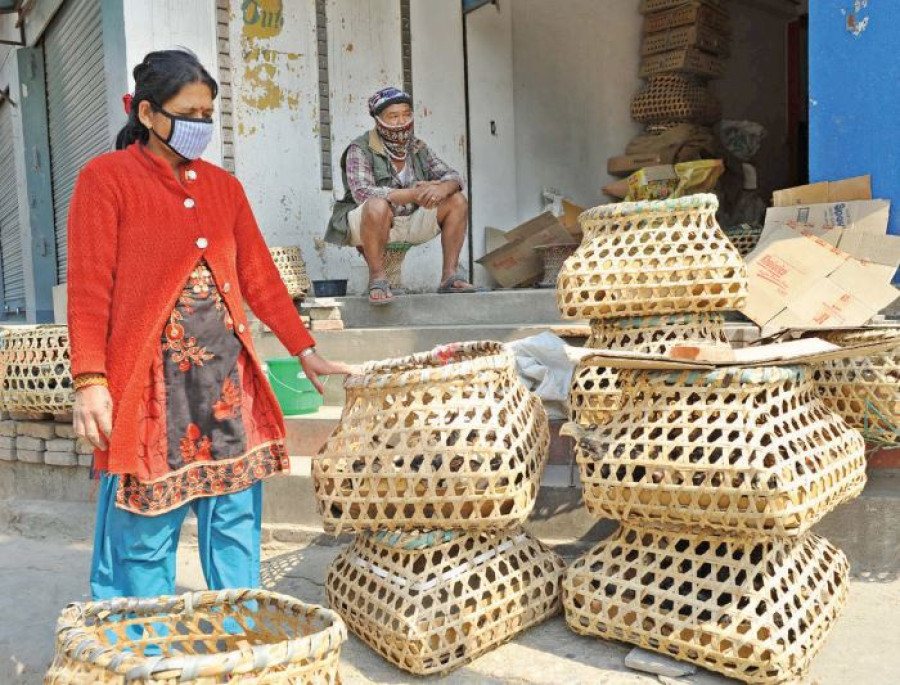National
Dependent on a daily cash flow and with few savings, small and medium enterprises risk collapse
The central bank has announced financial measures for the private sector but many believe small and medium enterprises will require a different approach.
Aditi Aryal
Khem Bhattarai owns a motorcycle workshop in Gairidhara where he employs four workers. Bhattarai earns about Rs40,000 a month but his expenses are almost the same, leaving him with few savings. His family of eight depends on income from the workshop to survive but ever since the lockdown, Bhattarai has no business and no means to feed his family.
“I have fixed costs to bear despite not making a rupee,” said Bhattarai.
He pays Rs15,000 in rent and does not expect it to be waived as his landlords depend on rent for their own livelihoods. He is also providing food and shelter for four of his workers who have not been able to go back to their hometowns due to the lockdown. With money fast running out, he is hoping for some remedy from the government.
Nepal Rastra Bank has announced a financial package for the private sector, primarily deferment of loans and exemptions from interest, but this assistance might not be enough to keep small and medium enterprises like Bhattarai’s afloat. Oftentimes, these businesses operate on very little capital and require a different approach.
“Small and medium enterprises might require more support from the government,” Shekhar Golchha, senior vice-president of the Federation of Nepalese Chambers of Commerce and Industry, told the Post last week. “They will require cheaper finance and tax rebates to survive.”
With economists predicting a global recession to be underway already, small businesses especially in developing countries such as Nepal, are most vulnerable, despite the fact that they are crucial for the health of the economy.
“We’ve had to cancel all our bookings and refund passengers who were unable to travel,” said Ram Timilsina, who owns a travel agency. “Channeling a huge amount of cash on such short notice was difficult, given our daily expenditures and loans to pay.”
Businesses in the travel and tourism sector, like travel agencies, hotels, restaurants and bars, have already been hit especially hard by the Covid-19 pandemic but the subsequent lockdown looks to cripple the entire economy, with most businesses shut down and workers staying home.
The lockdown could go so far as to turn many seasonal businesses insolvent. Many small businesses, like in the tourism sector and in apparel, rely heavily on seasonal customers to stay afloat for the rest of the year. For such businesses, the cost of operation can often be higher than their profits. Even if the government loosens the lockdown or lifts it entirely, customers may take a while to get back to their spending habits, as the impact of the lockdown is going to be widespread.
Because small and medium enterprises are by definition small, there is also a shared camaraderie that has led many business owners to continue to pay their workers. Bhattarai and Timilsina both said that they were continuing to pay their workers, despite having no cash flow.
“I want to support my employees during this crisis but I am in a difficult financial situation myself,” said Sunit Shrestha, who runs a small boutique in New Road that sells women’s clothing. “I have some loans from a cooperative that I have to pay back along with the rent for my store, so it is not sustainable for me to continue [paying them] if the lockdown extends for another month.”
For Kishor Adhikari, the co-founder of a newly established laundromat in Maitidevi, the future looks bleak. His business was picking up and was starting to break even when the pandemic hit.
“In Nepal, laundry is still considered a luxury. Our customers were mostly those with no access to water or rooftops, but this lockdown could mean that we lose out an entire customer base,” said Adhikari.
Businesses like Adhikari’s might not be turning over millions every year but they form a critical part of the economy, as they provide employment opportunities, services to local neighbourhoods, and even act as places of communal gathering.
“These enterprises provide employment to the lowest strata of society where any money earned is most likely to be spent rather than saved,” said Saurav Man Shrestha, an economist. “A possible recourse could be the government investing in various income generating trainings as these will increase the productivity of workers and their employability.”
According to economists, these businesses will require help in the form of subsidies on interest, taxes, and utilities payments, even grants to cover their payroll expenses.
Bishwambher Pyakurel, an economist and professor at Tribhuvan University, says that this lockdown is important for human health but it could mean disastrous outcomes for small and medium enterprises, which make up 22 percent of the economy.
“The government should come up with protectionist measures that ensure cash flow to help these businesses remain afloat, even after the lockdown,” he said.




 14.24°C Kathmandu
14.24°C Kathmandu















